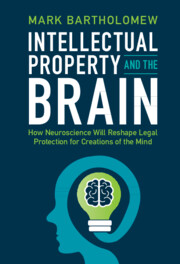
- Publisher:
- Cambridge University Press
- Online publication date:
- July 2022
- Print publication year:
- 2022
- Online ISBN:
- 9781009189545
- Subjects:
- Intellectual Property, Law, Psychology, Cognition


Although legal scholars have begun to explore the implications of neuroscientific research for criminal law, the field has yet to assess the potential of such research for intellectual property law – a legal regime governing over one-third of the US economy. Intellectual Property and the Brain addresses this gap by showing how tools meant to improve our understanding of human behavior inevitably shape the balance of power between artists and copyists, businesses and consumers. This first of its kind book demonstrates how neuroscience can improve our flawed approach to regulating creative conduct and commercial communications when applied with careful attention to the reasons that our system of intellectual property law exists. With a host of real-life examples of art, design, and advertising, the book charts a path forward for legal actors seeking reforms that will unlock artistic innovation, elevate economic productivity, and promote consumer welfare.
‘In this engaging and pathbreaking book, Professor Mark Bartholomew uncovers how neuroscience is poised to dramatically change intellectual property theory and practice. This innovative book is the first to explore the promise and peril of neuroscience for patent and copyright law. It’s a must read for lawyers, students, scholars, and anyone who has ever wondered about how the law protects our unique human creativity.’
Francis Shen - Associate Professor of Psychiatry, MGH & Harvard Medical School Center for Bioethics, Affiliated Professor, Harvard Law School
‘It would seem self-evident that discussions about intellectual property would consider properties of the intellect. Yet, our legal system seems reluctant to take seriously the vehicle of intellect-the human brain-in its deliberations. How should judges decide what makes products of the mind similar? By masterfully delving into the neuroscience of creativity, aesthetics, and decision-making as they apply to copyright, patent, and trademark law, Mark Bartholomew diagnoses the disarray of current legal practices and identifies how modern science might point to ways out of the confusion. This book is vitally important for legal scholars and practitioners preoccupied with protecting creations of the mind, for neuroscientists who care about real world implications of their research, and for anyone who wonders how the law shapes the economics of human creativity.’
Anjan Chatterjee - Professor of Neurology, Psychology, and Architecture, Director, Penn Center for Neuroaesthetics, University of Pennsylvania
‘Professor Bartholomew artfully and cogently melds a century of confusing intellectual property doctrine with decades of innovative insights from neuroscience to help us rethink how courts have approached copyright, design patent, and trademark cases. Readers also get a fresh perspective on law and psychology and that field’s take on cognition and emotion, as applied to art, design, and advertising. Law is not rocket science or brain surgery, but this important book teaches that the future of intellectual property law may lie in brain science.’
Shubha Ghosh - Crandall Melvin Professor of Law and Director, IP Commercialization and Innovation Law Curricular Program, Syracuse Intellectual Property Law Institute
‘By appreciating the challenges and possibilities emerging neuroscientific insights might present for the intellectual property law, this provocative book - a sophisticated thought experiment - will encourage reconsideration of our understanding of ‘creativity’ and aesthetics and ultimately compel reevaluation of law’s objects in this important field.’
Peter A. Alces - Rollins Professor of Law, William & Mary Law School, author of The Moral Conflict of Law and Neuroscience
 Loading metrics...
Loading metrics...
* Views captured on Cambridge Core between #date#. This data will be updated every 24 hours.
Usage data cannot currently be displayed.